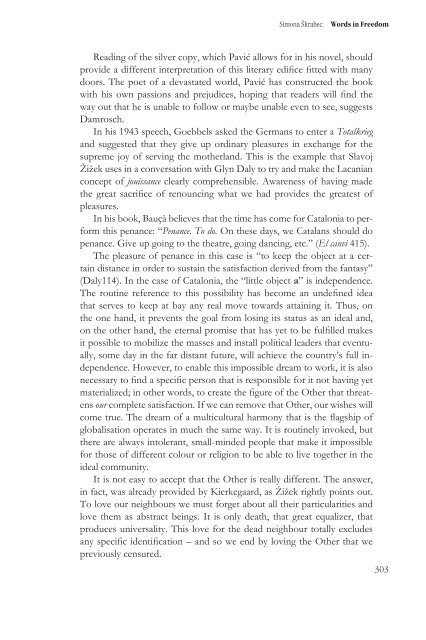Literatura in cenzura - Društvo za primerjalno književnost - ZRC SAZU
Literatura in cenzura - Društvo za primerjalno književnost - ZRC SAZU
Literatura in cenzura - Društvo za primerjalno književnost - ZRC SAZU
- No tags were found...
You also want an ePaper? Increase the reach of your titles
YUMPU automatically turns print PDFs into web optimized ePapers that Google loves.
Simona Škrabec:Words <strong>in</strong> FreedomRead<strong>in</strong>g of the silver copy, which Pavić allows for <strong>in</strong> his novel, shouldprovide a different <strong>in</strong>terpretation of this literary edifice fitted with manydoors. The poet of a devastated world, Pavić has constructed the bookwith his own passions and prejudices, hop<strong>in</strong>g that readers will f<strong>in</strong>d theway out that he is unable to follow or maybe unable even to see, suggestsDamrosch.In his 1943 speech, Goebbels asked the Germans to enter a Totalkriegand suggested that they give up ord<strong>in</strong>ary pleasures <strong>in</strong> exchange for thesupreme joy of serv<strong>in</strong>g the motherland. This is the example that SlavojŽižek uses <strong>in</strong> a conversation with Glyn Daly to try and make the Lacanianconcept of jouissance clearly comprehensible. Awareness of hav<strong>in</strong>g madethe great sacrifice of renounc<strong>in</strong>g what we had provides the greatest ofpleasures.In his book, Bauçà believes that the time has come for Catalonia to performthis penance: “Penance. To do. On these days, we Catalans should dopenance. Give up go<strong>in</strong>g to the theatre, go<strong>in</strong>g danc<strong>in</strong>g, etc.” (El canvi 415).The pleasure of penance <strong>in</strong> this case is “to keep the object at a certa<strong>in</strong>distance <strong>in</strong> order to susta<strong>in</strong> the satisfaction derived from the fantasy”(Daly114). In the case of Catalonia, the “little object a” is <strong>in</strong>dependence.The rout<strong>in</strong>e reference to this possibility has become an undef<strong>in</strong>ed ideathat serves to keep at bay any real move towards atta<strong>in</strong><strong>in</strong>g it. Thus, onthe one hand, it prevents the goal from los<strong>in</strong>g its status as an ideal and,on the other hand, the eternal promise that has yet to be fulfilled makesit possible to mobilize the masses and <strong>in</strong>stall political leaders that eventually,some day <strong>in</strong> the far distant future, will achieve the country’s full <strong>in</strong>dependence.However, to enable this impossible dream to work, it is alsonecessary to f<strong>in</strong>d a specific person that is responsible for it not hav<strong>in</strong>g yetmaterialized; <strong>in</strong> other words, to create the figure of the Other that threatensour complete satisfaction. If we can remove that Other, our wishes willcome true. The dream of a multicultural harmony that is the flagship ofglobalisation operates <strong>in</strong> much the same way. It is rout<strong>in</strong>ely <strong>in</strong>voked, butthere are always <strong>in</strong>tolerant, small-m<strong>in</strong>ded people that make it impossiblefor those of different colour or religion to be able to live together <strong>in</strong> theideal community.It is not easy to accept that the Other is really different. The answer,<strong>in</strong> fact, was already provided by Kierkegaard, as Žižek rightly po<strong>in</strong>ts out.To love our neighbours we must forget about all their particularities andlove them as abstract be<strong>in</strong>gs. It is only death, that great equalizer, thatproduces universality. This love for the dead neighbour totally excludesany specific identification – and so we end by lov<strong>in</strong>g the Other that wepreviously censured.303
















